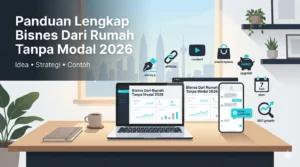The Long-Term Value of Trust in B2B Deals
Trust as the Foundation of Business Success
In the realm of business to business (B2B) transactions, trust is often the most overlooked but critical factor for long-term success.
While most businesses focus on pricing, performance, or market positioning, trust serves as the invisible glue that holds partnerships together.
Without trust, no amount of contractual agreements or negotiations can truly solidify a business relationship. In fact, trust is the backbone of repeat business, sustained collaborations, and, ultimately, business growth.
Upskill Staf Anda: Bina Website Mesra SEO
Bengkel praktikal 2 hari untuk bina laman web syarikat yang kemas, pantas, dan mudah diurus.
Domain + Hosting + Elementor Pro PERCUMA 1 tahun

Trust is not simply about reliability in fulfilling agreements, but about showing genuine commitment to your business to business partner’s success.
It involves the consistent demonstration that both parties are invested in mutual growth, creating a foundation that goes beyond just transactions.
In an era of increasing competition and fluctuating market dynamics, businesses that prioritize trust are more likely to weather market uncertainties because their relationships are built on long-term value, not short-term gains.
Building Trust Through Consistency
Trust is not built overnight—it is the product of consistency over time.
Every interaction, deliverable, and negotiation is an opportunity to reinforce or weaken the trust that exists between two businesses.
Providing consistent value, whether through meeting deadlines, maintaining quality, or delivering on promises, helps to develop trust gradually and effectively.
A unique aspect of trust-building in business to business that is seldom discussed is the importance of empathy and understanding in interactions.
Recognizing that every business goes through its own set of challenges, whether financial, operational, or external, can lead to more forgiving and flexible partnerships.
For example, showing understanding when your business to business partner is experiencing difficulties and adjusting timelines or expectations can be a significant trust-building action.
t sends the message that the relationship is not solely transaction-based but is rooted in mutual respect and support, which is vital for long-term cooperation.
As business to business relationships mature, the value of trust compounds.
It allows both parties to take bigger risks, invest in larger projects, and explore new innovations together without the constant fear of being let down or taken advantage of.
This is the ultimate return on investment for trust in the business to business landscape—sustainable, long-term growth that benefits both partners equally.
Tailoring Solutions to Client Needs for Stronger Partnerships
Understanding Client Pain Points
In business to business (B2B) relationships, one of the most effective strategies for building stronger partnerships is through understanding the unique needs and challenges that your clients face.
While many companies approach business to business relationships with a one-size-fits-all solution, those who take the time to deeply understand the specific pain points of their clients stand out.
In fact, this level of attentiveness is often what separates successful business to business (B2B) relationships from those that are short-lived or transactional in nature.
Understanding a client’s pain points goes beyond asking surface-level questions.
It requires a comprehensive approach, which involves studying the client’s business model, industry challenges, and long-term goals.
By taking this deeper dive into their business, you position yourself as a true partner rather than just a vendor.
For instance, recognizing that a client’s logistics process is inefficient may not seem groundbreaking, but suggesting a tailored strategy that aligns with their specific operational limitations and future growth plans is what strengthens the relationship.
Moreover, this level of understanding also allows businesses to anticipate client needs before they even arise.
Being proactive in identifying potential challenges not only showcases expertise but also builds trust and demonstrates a genuine investment in the client’s success.
Businesses that understand these nuances often find themselves becoming trusted advisors rather than simply service providers, fostering a relationship that transcends the typical buyer-seller dynamic.
Customization as a Competitive Edge
Customization in business to business transactions is more than a trend—it’s a competitive edge that drives lasting partnerships.
In today’s business environment, clients expect solutions that are not only effective but also tailored to their specific needs.
Offering generic, pre-packaged solutions may work for some, but businesses that provide customized services tend to experience deeper, more enduring client relationships.
Customization allows you to differentiate your business from competitors by demonstrating that you are willing to invest in understanding and addressing the unique needs of each client.
This bespoke approach gives clients the confidence that you are focused on their long-term success rather than just closing a deal.
In industries where differentiation can be challenging, this can be a powerful way to build loyalty.
For example, a company that offers business software might take a tailored approach by integrating features specific to their client’s industry, such as compliance tracking for healthcare organizations or supply chain management for manufacturing firms.
This tailored solution not only solves immediate problems but also aligns with the client’s broader objectives, reinforcing the partnership as a collaborative and growth-oriented one.
Additionally, customization is a key factor in driving innovation within business to business relationships.
By tailoring solutions to client needs, businesses are often pushed to innovate and find new ways to solve problems.
This process of innovation strengthens the partnership, as both businesses grow and adapt together.
Clients who see that their partners are willing to invest in custom solutions are more likely to remain loyal, share referrals, and expand the scope of their engagements.
The Importance of Listening and Flexibility
A key aspect of tailoring solutions to client needs is the ability to listen carefully and remain flexible.
While most businesses claim they listen to their clients, many fall into the trap of offering solutions based on their own perceptions rather than what the client truly needs.
Successful business to business relationships require an open line of communication where both parties feel comfortable sharing their concerns, needs, and aspirations.
Flexibility also plays a crucial role in strengthening these partnerships.
Businesses that are rigid in their approach risk alienating clients when their needs shift or when unexpected challenges arise.
On the other hand, businesses that show flexibility—whether by adjusting timelines, revising solutions, or offering additional support—demonstrate that they are genuinely invested in the success of the partnership.
In the long term, the ability to tailor solutions to meet specific client needs—through a combination of listening, customization, and flexibility—creates a partnership that is not only resilient but also capable of growing over time.
When businesses align their success with that of their clients, they pave the way for mutual growth, innovation, and a lasting business to business relationship built on shared goals and trust.
The Power of Transparency in Nurturing Loyalty
Clear Communication Builds Confidence
Transparency is one of the most powerful, yet underutilized, tools in building loyalty within business-to-business (B2B) relationships.
Businesses that prioritize clear and open communication foster confidence, trust, and a sense of security. In business to business partnerships, where decisions can have far-reaching impacts, transparency shows a commitment to honesty and shared success.
When companies are transparent about their processes, expectations, and challenges, it creates an environment where both parties feel secure in their collaboration.
Clear communication eliminates unnecessary surprises and misunderstandings, which could otherwise damage the relationship.
Key benefits of transparency include:
- Reducing the risk of miscommunication.
- Encouraging open dialogue for better problem-solving.
- Building trust by showing integrity in every interaction.
Addressing Challenges with Transparency
Challenges are inevitable in any business relationship, but how a company responds to them can make all the difference.
Businesses that are upfront about potential issues—such as project delays, resource shortages, or unexpected costs—demonstrate integrity.
Being transparent about challenges doesn’t just mitigate frustration; it also opens up opportunities for problem-solving together.
This approach turns potentially damaging situations into moments of growth for the partnership. Both parties can work collaboratively to find solutions, strengthening the overall relationship.
Enhancing B2B Relationships with Data-Driven Insights
Utilizing Data to Drive Decision-Making
Data-driven insights have revolutionized how businesses operate, and business to business relationships are no exception.
Leveraging data allows companies to understand client behavior, anticipate needs, and make informed decisions.
In business to business partnerships, using data analytics can enhance communication, performance tracking, and future planning.
By reviewing key performance indicators (KPIs), businesses can pinpoint areas where improvements are needed and tailor strategies to meet their partner’s goals.
This data-centric approach ensures that decisions are not based on assumptions, but on measurable results.
Examples of data that drive business to business relationships include:
- Customer satisfaction metrics to understand client happiness.
- Sales data to identify trends and future needs.
- Performance reports to adjust ongoing services.
Predictive Analytics for Future Growth
Predictive analytics takes data usage one step further, allowing businesses to forecast future trends and make proactive decisions.
For instance, identifying upcoming market shifts or seasonal patterns helps business to business partners prepare together, ensuring that both are well-positioned to handle changes.
This foresight not only benefits day-to-day operations but also strengthens long-term planning.
Clients who feel their partners are one step ahead will be more likely to stay loyal, as they see the value in their partner’s ability to drive their business forward.
Collaborative Innovation as a Driver of Sustainable Growth
Partnering for Innovation
Collaboration between businesses is often the catalyst for innovation.
In business to business relationships, working closely together on innovative solutions creates opportunities for mutual growth.
By brainstorming and collaborating on new ideas, both businesses can push the boundaries of what they can achieve individually.
Rather than being reactive, businesses that seek out collaborative innovation proactively position themselves for success.
This joint effort not only improves the partnership but also often leads to groundbreaking ideas that benefit both parties.
Innovation as a Continuous Process
Innovation isn’t a one-time effort. business to business relationships that focus on continual improvement and innovation are the ones that stand the test of time.
As markets evolve, so must the solutions offered. Regular collaboration on new products, services, or operational improvements ensures that the partnership remains fresh, relevant, and valuable.
Key ways to drive continuous innovation include:
- Regular brainstorming sessions to identify new opportunities.
- Joint research and development efforts.
- Feedback loops to test and refine ideas quickly.
Building Long-Term B2B Relationships Through Ethical Practices
Upholding Integrity in All Interactions
Ethical behavior is essential for sustaining long-term business to business relationships.
When businesses act with integrity in all interactions, it reinforces trust, loyalty, and respect.
Companies that consistently uphold high ethical standards build a reputation that transcends contracts and market trends.
Maintaining ethics includes transparency in pricing, honesty in communication, and ensuring that every business decision is aligned with the values of fairness and respect.
The Impact of Reputation in B2B Circles
A strong reputation for ethical behavior can be one of the most valuable assets in business to business relationships.
Word travels fast in business circles, and companies known for their integrity often attract more referrals and repeat business.
Advantages of ethical practices in B2B include:
- Strengthened client loyalty and retention.
- Enhanced business reputation within the industry.
- Increased likelihood of being recommended to other businesses.
The Role of Networking in Business to Business Success
Expanding Networks for Growth
Networking is crucial for success in B2B environments.
Platforms like BNI, which foster professional connections, provide businesses with the opportunity to meet potential partners, clients, and collaborators.
Expanding one’s network is often the first step toward building valuable B2B relationships that can result in mutual growth.
Leveraging Global Networks for International Opportunities
In today’s interconnected world, global networks are increasingly important.
Being part of a global network allows businesses to expand beyond local markets, entering new territories and unlocking fresh opportunities for collaboration.
Benefits of global networking include:
- Access to international markets.
- Opportunities to learn from global business trends.
- Collaboration across borders for greater innovation.
Strengthening B2B Bonds Through Regular Engagement
The Importance of Consistent Communication
Maintaining regular communication is critical to the health of any B2B relationship.
Businesses that stay in touch with their partners, even when there are no immediate deals or projects, keep the relationship strong and open to future opportunities.
Adding Value Through Thought Leadership
Consistent communication doesn’t have to be purely transactional.
Sharing thought leadership content, such as industry trends, research, or insights, adds value to the relationship and positions your business as an expert in the field.
Managing Expectations for Mutual Success
Setting Clear Expectations from the Start
Setting clear, realistic expectations at the beginning of a B2B partnership prevents future misunderstandings.
From timelines to deliverables, clarity ensures both parties know what to expect, reducing friction and building a foundation for success.
Regularly Reviewing and Adjusting Expectations
Business environments are constantly changing, and so too are the needs of clients.
Regularly reviewing and adjusting expectations as the partnership evolves ensures both sides remain satisfied and aligned in their goals.
Measuring Success and Continuously Improving
Setting Measurable Goals
Setting clear and measurable goals is critical for tracking the success of B2B partnerships.
Whether it’s revenue growth, customer retention, or product development milestones, having tangible objectives allows businesses to evaluate the effectiveness of their relationship.
Continuous Improvement for Lasting Success
Regularly evaluating and improving strategies within the partnership helps ensure ongoing success.
Businesses that commit to continuous improvement demonstrate their investment in long-term growth, which strengthens the partnership.
Key strategies for continuous improvement include:
- Regular performance reviews.
- Feedback loops from both parties.
- Adjusting processes to meet evolving needs.
Conclusion
Building successful business-to-business relationships requires a thoughtful, strategic approach centered on trust, transparency, and collaboration.
By understanding client needs, driving innovation, and prioritizing ethical practices, businesses can foster partnerships that thrive in the long term.
For more insights on how to enhance your business growth and build lasting B2B relationships, visit socmad.com, a trusted Malaysia online business blog.








